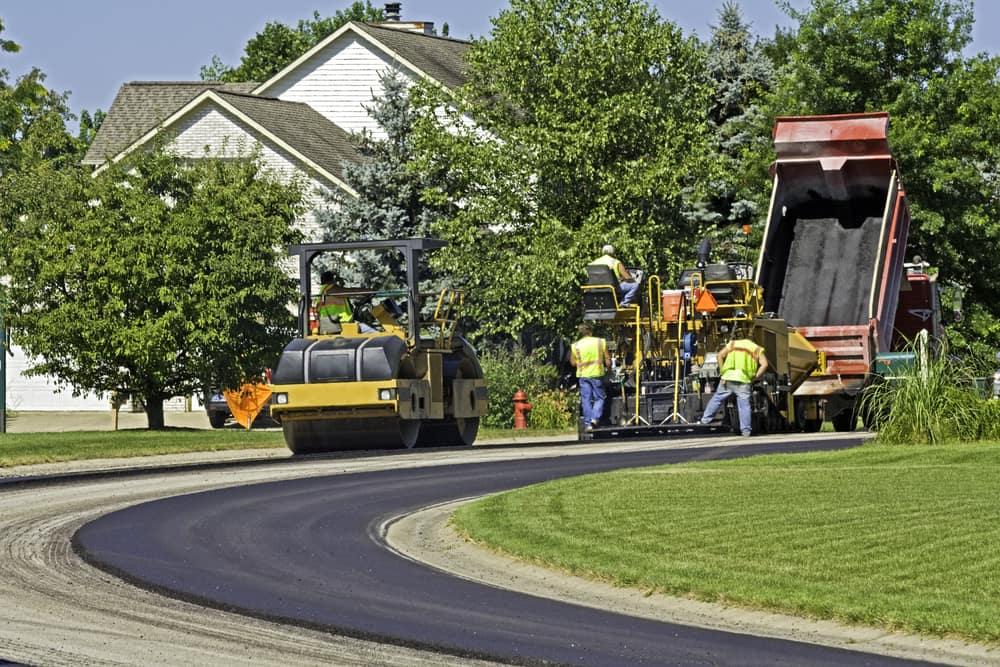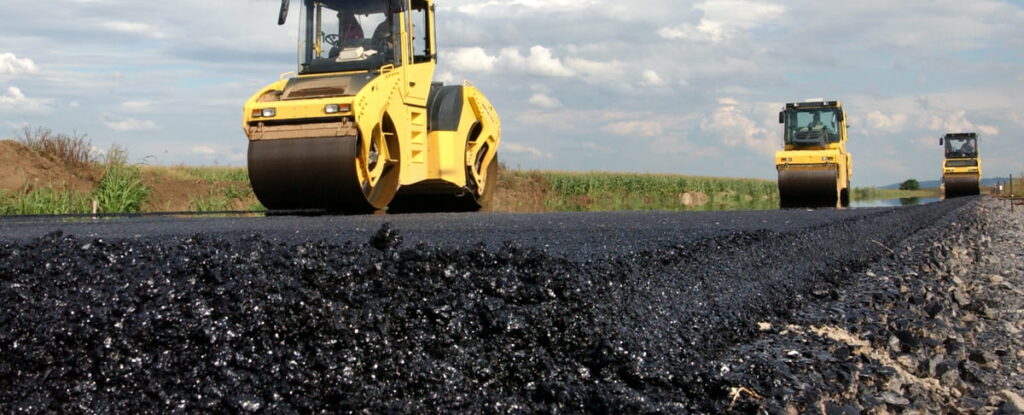As a homeowner, you work hard to keep your Minnesota property looking its best. You might be looking at your driveway and thinking it’s time to replace it, but you have questions before making the financial commitment.
If the weather forecast is a little dicey, you might ask, “can you do asphalt paving in the rain”? You know that there is some construction work that continues in the rain, but you worry about your new driveway. You want the job done right.
You worry that your property might be in a state of disarray longer if there’s rain. The quick answer is: no, you can’t do asphalt paving in the rain. However, you need more information, and this guide can help you understand “how does rain affect asphalt paving” and “what would happen if asphalt paving was done in the rain.”
How Does Rain Affect Asphalt Paving?
You dream of a gorgeous new asphalt driveway, where you can park your car or play basketball with your kids at night. However, you worry it isn’t the right time to install a new asphalt driveway because there’s rain in the forecast.
To understand why asphalt paving isn’t done in the rain, you need to understand how rain affects asphalt paving. In the simplest of terms, asphalt is made of petroleum, which is oil. You know that oil and water don’t mix well.
If you try to lay asphalt during a rain shower or even immediately afterward, it will negatively affect your asphalt paving project. In some cases, you need to wait a few days for the ground around your project to dry out before you start asphalt paving. The ground does need to be completely dry before paving with asphalt.
What Can the Effects Be When You Do Asphalt Paving in the Rain?
Rain affects asphalt paving by bringing the oil to the surface of the asphalt. This creates a variety of effects on your new asphalt driveway that you don’t want. Here’s a look at a few:
Drying Time
If you do asphalt paving in the rain, the oil rises to the surface, and it can take significantly more time for the asphalt to cure. It might delay the usage of the surface for a few days or weeks.
Structural Damage
Rain affects asphalt paving by displacing the oil, and this can lead to structural damage in your new asphalt driveway or surface. You might see pitting or cracking on the surface of the asphalt if there’s damage from rain. These issues might seem small, but they can quickly grow to become larger issues, including potholes. If you have structural damage, you’ll need repairs much sooner than expected.
Compromised Integrity
Asphalt paving is done when the asphalt mixture is extremely hot, and if it rains, the rain cools the asphalt too quickly. If the base is recently laid, rain can create a barrier of steam between the top layer and the base. Over time, the steam cools and creates trapped water between the base and top layer of asphalt, creating compromise integrity.
How Does Rain Affect Asphalt Paving Before It Cures?
After your asphalt paving is complete and dries, you’ll be able to park your car and walk on it. However, it can take three to six months before it’s completely cured. During this time, rain can affect your asphalt paving.
There isn’t any way to schedule asphalt paving to ensure that you won’t see rain for the next three to six months after it’s paved. You can take steps to ensure that rain doesn’t damage your asphalt surface before it’s cured. Here are a few to consider:
- Rotate the location of where you park your car: On freshly laid asphalt, your car’s tires can create dips in your driveway if you park in the same spot each day. When rain arrives, these dips will fill with water, and without a place to drain, this water damages your asphalt that isn’t completely cured yet.
- Repair and fill cracks immediately: You might see a small crack in your new driveway due to a heavy rainstorm and shrug it off. You have time. However, it’s always best to fill in and repair these cracks as soon as you notice them. If you leave them untreated, these tiny cracks grow into monster problems, and it won’t take too long.
- Add a waterproof sealant to your asphalt surface: When you seal your asphalt driveway or some other asphalt surface, the water doesn’t make it into the uncured material. You’ll know that it’s working when you see little beads of water on the asphalt surface, and you can rest assured water isn’t getting into the subsurface or base while you’re waiting for it to cure and beyond.
- Clean spills immediately: From cars leaking oil to your kids dropping a drink, your new asphalt surface might see a lot of spills while it’s curing. You need to clean these spills immediately and not allow them to seep into the curing asphalt. While you always want to clean spills on your asphalt driveway, it’s especially important during the curing period to avoid damage.
All of these tips help ensure that rain and other substances don’t have a negative effect on your new asphalt surface. You don’t want to go through the hassle of having it resurfaced any sooner than you need to do it.

Rescheduling for Asphalt Paving After the Rain
When rain is forecasted or sudden storms pop up, your asphalt paving project gets delayed ensuring it’s done the right way. The ground needs to be completely dried out before paving can resume. Your contractor will keep you updated, so you’ll know when work is going to resume.
At Richfield Blacktop, we understand how frustrating it is to learn that you can’t do asphalt paving in the rain, but we want to provide you with a driveway that’s built to last. Our talented team always makes the best choices for your project. Contact us today to learn more!





